Five Minutes: The Truman Show
 There’s a maxim that says a movie teaches you how to watch it, but Peter Weir’s The Truman Show teaches you how to watch it the wrong way. And in its brazen audience cues, it hints that you should question your reaction to the film. This is a movie that was made for misunderstanding.
There’s a maxim that says a movie teaches you how to watch it, but Peter Weir’s The Truman Show teaches you how to watch it the wrong way. And in its brazen audience cues, it hints that you should question your reaction to the film. This is a movie that was made for misunderstanding.

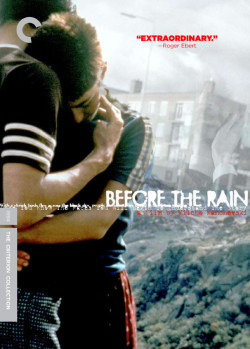 For the first time since fall 2006, I updated the
For the first time since fall 2006, I updated the 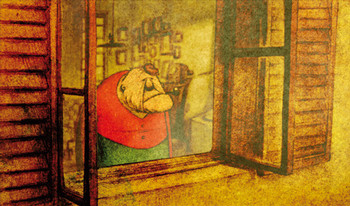 I’ll start with an admonition: You have no reason not to have a horse in the short-film categories for the Oscars. These should be your favorite races, because they require relatively small investments of time. If you see and hate The Reader, you’ve lost 124 minutes of your life. If you see and hate Lavatory – Lovestory, you’re out 10 minutes. And the chances of you hating Lavatory – Lovestory are much smaller. Alas, each has about the same chance of winning the top prize in its category.
I’ll start with an admonition: You have no reason not to have a horse in the short-film categories for the Oscars. These should be your favorite races, because they require relatively small investments of time. If you see and hate The Reader, you’ve lost 124 minutes of your life. If you see and hate Lavatory – Lovestory, you’re out 10 minutes. And the chances of you hating Lavatory – Lovestory are much smaller. Alas, each has about the same chance of winning the top prize in its category.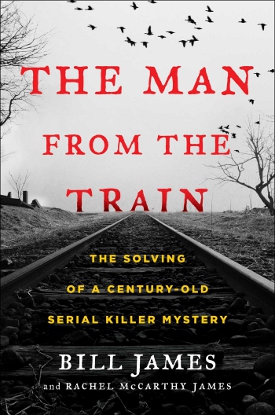 Bill James’ The Man from the Train is an ugly book, but for the most part you shouldn’t read that as a criticism. It’s ugly in three ways, and two of those were certainly unavoidable given the subject – the murders of more than 100 people in the early part of the 20th Century. But the third way could have been mitigated to at least some degree.
Bill James’ The Man from the Train is an ugly book, but for the most part you shouldn’t read that as a criticism. It’s ugly in three ways, and two of those were certainly unavoidable given the subject – the murders of more than 100 people in the early part of the 20th Century. But the third way could have been mitigated to at least some degree.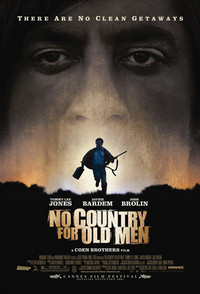 My first thought after watching Joel and Ethan Coen’s No Country for Old Men – amid groans from others in the theater – was that I understood why some people hate it.
My first thought after watching Joel and Ethan Coen’s No Country for Old Men – amid groans from others in the theater – was that I understood why some people hate it.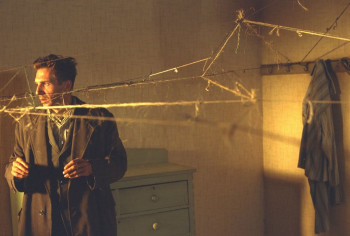 After watching David Cronenberg’s Spider, I was acutely underwhelmed and disappointed. It could be that the movie’s impact on my first viewing – akin to dropping a light object onto a feather pillow – was a function of overblown expectations. Or it could be that the movie was designed to end with more of a whimper than a bang.
After watching David Cronenberg’s Spider, I was acutely underwhelmed and disappointed. It could be that the movie’s impact on my first viewing – akin to dropping a light object onto a feather pillow – was a function of overblown expectations. Or it could be that the movie was designed to end with more of a whimper than a bang. On “Puttin’ People on the Moon,” the Driver-By Truckers’ Patterson Hood sings a litany of tragedies personal and regional: “Mary Alice got cancer just like everybody here / Seems everyone I know is gettin’ cancer every year / And we can’t afford no insurance, I been 10 years unemployed / So she didn’t get no chemo so our lives was destroyed / And nothin’ ever changes, the cemetery gets more full / And now over there in Huntsville, even NASA’s shut down too.” The song is typical Drive-By Truckers: bleak, detailed, populist, Southern, and with enough twangy muscle that you can play it loud and ignore the skill of its songwriting and the loving attention it pays to the downtrodden, heard in the indignant desperation of Hood’s damaged falsetto on the chorus.
On “Puttin’ People on the Moon,” the Driver-By Truckers’ Patterson Hood sings a litany of tragedies personal and regional: “Mary Alice got cancer just like everybody here / Seems everyone I know is gettin’ cancer every year / And we can’t afford no insurance, I been 10 years unemployed / So she didn’t get no chemo so our lives was destroyed / And nothin’ ever changes, the cemetery gets more full / And now over there in Huntsville, even NASA’s shut down too.” The song is typical Drive-By Truckers: bleak, detailed, populist, Southern, and with enough twangy muscle that you can play it loud and ignore the skill of its songwriting and the loving attention it pays to the downtrodden, heard in the indignant desperation of Hood’s damaged falsetto on the chorus.